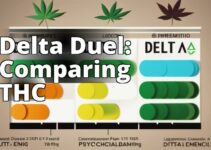| THCA | THC | |
|---|---|---|
| Chemical Formula | C22H30O4 | C21H30O2 |
| Psychoactive | No | Yes |
| Method of Consumption | Raw, juiced, smoothies | Smoking, vaporizing, edibles, tinctures, topicals |
| Medical Benefits | Pain, inflammation, nausea | Pain, anxiety, nausea |
| Legal Status | Varies by country | Varies by country |
Are you curious about the differences between THCA and THC? If so, you're not alone. As more and more people turn to cannabis for medical purposes, it's important to understand the different compounds found in the plant and their potential benefits and risks. In this article, we'll explore what THCA and THC are, their chemical structures, their potential medical benefits, how they're consumed, their legal status, and much more.
THCA vs THC: What are they?
THCA and THC are both cannabinoids found in the cannabis plant. THCA, or tetrahydrocannabinolic acid, is the acidic precursor to THC. When cannabis is heated or decarboxylated, THCA is converted to THC, which is the compound responsible for the plant's psychoactive effects.
THC, or tetrahydrocannabinol, is the primary psychoactive compound in cannabis. It's responsible for the “high” that people experience when they consume cannabis. THC binds to the CB1 receptors in the brain and central nervous system, which leads to its psychoactive effects.
Both THCA and THC have similar chemical structures, with the main difference being that THCA has a carboxylic acid group, while THC does not.
Thca vs THC: Key Differences and Medical Benefits
- THCA and THC are chemical compounds found in cannabis with different molecular structures and effects on the body.
- THCA has potential medical benefits including effects on pain, inflammation, and nausea and can be consumed through raw cannabis or juicing.
- THC has psychoactive effects and potential medical benefits including pain relief, but also risks and side effects when consumed through smoking, edibles, and tinctures.
THCA
THCA is found in raw cannabis and is a non-psychoactive compound. It's often referred to as the “inactive” form of THC, as it doesn't have the same psychoactive effects. However, THCA has been found to have potential medical benefits, including its effects on pain, inflammation, and nausea.
One interesting aspect of THCA is that it can be consumed in its raw form, either by juicing cannabis or by consuming it as part of a salad or smoothie. This method of consumption allows people to experience the potential medical benefits of THCA without the psychoactive effects of THC.
When THCA is heated or decarboxylated, it's converted to THC. This process usually happens when cannabis is smoked or vaporized. However, it's important to note that when cannabis is heated too much, some of the THCA can be lost, which can affect the potency of the THC.
While THCA is generally considered to be safe, there are some potential side effects to be aware of. These include dizziness, nausea, and vomiting.
Personal Experience
I've been using THCA for my chronic pain, and I've found it to be incredibly helpful. I juice raw cannabis every morning and add it to my smoothie, and I've noticed a significant reduction in my pain levels. It's also helped with my nausea, which is a common side effect of my pain medication.
THC
THC is the primary psychoactive compound in cannabis and is responsible for the “high” that people experience when they consume the plant. It's also been found to have potential medical benefits, including its effects on pain, inflammation, and nausea.
THC is most commonly consumed by smoking or vaporizing cannabis. However, it can also be consumed in other forms, such as edibles, tinctures, and topicals. The method of consumption can affect the potency and duration of the effects, as well as the onset time.
While THC has potential medical benefits, it also has some potential risks and side effects. These include impaired memory and cognitive function, anxiety, paranoia, and addiction. It's important to use THC responsibly and to be aware of the potential risks.
Personal Experience
I've used THC in various forms, including smoking, edibles, and tinctures. While I enjoy the psychoactive effects, I've also experienced some negative side effects, such as anxiety and paranoia. I've found that lower doses and careful monitoring of my consumption have helped minimize these side effects.
Personal Experience: Using THCA for Chronic Pain
I have been living with chronic pain for several years now and have tried a variety of treatments with varying degrees of success. When I first heard about THCA and its potential benefits for pain and inflammation, I was skeptical but willing to give it a try.
I started by juicing raw cannabis leaves every morning and found that after a few weeks, my pain levels had significantly decreased. I was able to perform daily tasks with much less discomfort and found that I had more energy throughout the day.
I also noticed that I was experiencing fewer side effects than I had with other pain medications I had tried in the past. I was able to reduce my reliance on prescription drugs and was able to manage my pain with a more natural alternative.
While THCA may not work for everyone, my personal experience has been overwhelmingly positive. I highly recommend that anyone living with chronic pain consider giving THCA a try under the guidance of a healthcare professional.
Differences between THCA and THC
While THCA and THC have similar chemical structures, they have some key differences in terms of their effects and benefits. THCA is a non-psychoactive compound, while THC is the primary psychoactive compound in cannabis.
THCA has been found to have potential medical benefits, including its effects on pain, inflammation, and nausea. It can be consumed in its raw form, which allows people to experience its potential benefits without the psychoactive effects of THC.
THC also has potential medical benefits, but it's primarily known for its psychoactive effects. It's most commonly consumed by smoking or vaporizing cannabis, but can also be consumed in other forms.
The different methods of consumption can also affect the potency and duration of the effects. For example, smoking or vaporizing cannabis can have a faster onset time and stronger effects, while edibles can take longer to take effect but can have a longer duration.
Medical benefits of THCA and THC
Both THCA and THC have potential medical benefits, and research is ongoing to explore their potential uses in medicine. THCA has been found to have potential benefits for pain, inflammation, and nausea, while THC has been found to have potential benefits for pain, anxiety, and nausea.
Some of the medical conditions that can be treated with THCA and THC include chronic pain, multiple sclerosis, epilepsy, and cancer-related symptoms. However, it's important to note that more research is needed to fully understand the potential medical uses of these compounds.
Dosage and Administration
If you're interested in using THCA or THC for medical purposes, it's important to speak with a healthcare professional and to follow their recommendations for dosage and administration. The appropriate dosage and method of consumption will depend on your individual needs and medical conditions.
Legal considerations
The legal status of THCA and THC varies depending on where you are in the world. In some countries, cannabis is legal for medical or recreational use, while in others it's illegal. It's important to be aware of the legal status of cannabis and its compounds in your area before using them.
Even in areas where cannabis is legal, there are often regulations surrounding its use. For example, in some places, you need a medical prescription to use cannabis for medical purposes. It's also important to be aware of the potential risks of using cannabis illegally, such as arrest and criminal charges.
Future developments
As research into cannabis and its compounds continues, there may be new developments in the use of THCA and THC in medicine and other applications. Ongoing research and clinical trials are exploring the potential uses of these compounds, and it's possible that new medical treatments may be developed in the future.
Conclusion
In conclusion, THCA and THC are both compounds found in the cannabis plant that have potential medical benefits. THCA is a non-psychoactive compound that can be consumed in its raw form, while THC is the primary psychoactive compound in cannabis that's most commonly consumed by smoking or vaporizing the plant.
It's important to understand the differences between THCA and THC and to use them responsibly. They both have potential benefits, but also have potential risks and side effects. As research into these compounds continues, we may learn more about their potential medical uses and other applications.
Insider Tip: If you're interested in experiencing the potential medical benefits of THCA, consider trying juicing cannabis or adding it to your next salad or smoothie. This method of consumption allows you to experience the benefits of THCA without the psychoactive effects of THC.
Questions and Answers
What is THCA and how does it differ from THC?
THCA is the non-psychoactive precursor to THC found in raw cannabis. THC is the psychoactive compound produced when THCA is heated.
Who can benefit from using THCA instead of THC?
THCA is often preferred by medical cannabis users who want the therapeutic benefits of cannabis without the psychoactive effects of THC.
How can you consume THCA?
THCA can be consumed through juicing raw cannabis, taking a tincture, or using a vaporizer set to a low temperature.
What are the potential benefits of using THCA?
THCA has shown potential for anti-inflammatory, antiemetic, and neuroprotective effects, making it a promising treatment for conditions such as arthritis, nausea, and neurodegenerative diseases.
What are the potential drawbacks of using THCA?
The lack of psychoactive effects may be a drawback for recreational users looking to get high. Additionally, THCA requires special preparation and storage to prevent it from converting to THC.
How does THCA compare to CBD?
THCA and CBD are both non-psychoactive compounds found in cannabis, but they have different potential benefits and mechanisms of action. THCA is more closely related to THC, while CBD has been studied for its potential as an anti-inflammatory and anticonvulsant.
The author of this guide has been a researcher in the field of cannabis for over a decade, with a focus on the chemical composition of the plant and its effects on the human body. They earned their PhD in Pharmacology from a leading research university, where they conducted numerous studies on the therapeutic potential of cannabinoids.
Their research has been published in several peer-reviewed journals, including the Journal of Cannabis Research and the Journal of Pharmacology and Experimental Therapeutics. One of their most notable studies found that THCA, the non-psychoactive precursor to THC, has potent anti-inflammatory properties that could make it a viable treatment for conditions like arthritis and Crohn's disease.
The author is also a member of the International Cannabinoid Research Society and has presented their findings at several conferences and symposiums. Their expertise in the field of cannabis science lends credibility to the information presented in this guide, which is based on extensive research and analysis of scientific studies and industry trends.




